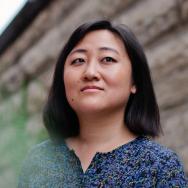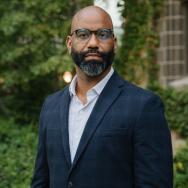Ling Ma, AB’05, an award-winning University of Chicago fiction writer renowned for prose that highlights the similarities between the fantastical and the everyday, has been awarded a 2024 MacArthur Fellowship.
Given each year by the John D. and Catherine T. MacArthur Foundation, the prestigious grants recognize individuals from across disciplines who show “exceptional originality in and dedication to their creative pursuits.” Fellows receive $800,000 stipends to use as they see fit.
“I am amazed that strangers who have read my work decided to nominate or recommend my fiction,” Ma said. “For someone who spends most of their days alone, that's pretty unbelievable.”
Ma is recognized for her writing, which mixes mundane, familiar settings like corporate offices and shopping malls with the fantastical—zombies and yeti boyfriends—to illuminate the surrealism within the reality of today’s world. With her characteristic deadpan humor, Ma’s characters navigate the complexities and uncanniness of relationships, alienation and identity. Her work, including the novel Severance and short story collection Bliss Montage have received the Kirkus Prize, Whiting Award, Story Prize and the National Book Critics Circle Award, among others.
Formerly an assistant professor of practice in the arts in UChicago's Program of Creative Writing, Ma will return to the University as an associate professor in the Department of English and Literature in January 2025.
“I’m just thrilled that Ling Ma has won the MacArthur,” said colleague Rachel Cohen, professor of practice in the arts in UChicago’s Program of Creative Writing. “This is a terrific confirmation of what is already such a stellar career. Ling’s incredible rigor, determination, and unusual mind have always produced strikingly original work, and I am so glad that she will be strongly supported in continuing to make her own path.”
In a spookily prescient debut, Ma’s apocalyptic novel Severance (2018) follows Candace Chen as she navigates society’s collapse in the face of the “Shen Fever.” The infected—initially difficult to spot—enter a zombie-like trance as they perform daily tasks over and over until they waste away. As protagonist Cadence escapes New York (and her monotonous book production job in the Bibles department), she is thrown into nostalgia, reflecting on her childhood in Fujian, China, whilst finding her place within a band of quirky survivors.
Part office satire, part zombie thriller, part bending of the immigration narrative, Severance pokes fun at corporate culture while revealing the horror of routine and life under capitalism.
“I thought about how companies would react when these catastrophes happened,” said Ma in a 2023 interview. “I thought about my jobs, how people interact in the workplace and the power hierarchies. And how the media metabolizes larger-than-life events, trying to create a narrative for us in real time.”
Ma penned her short story collection Bliss Montage (2022) during the height of the pandemic. The collection’s eight stories blur lines between genres, and between reality and madness. In “G,” the narrator becomes invisible after her childhood friend gives her a too-strong dose of a drug. “Peking Duck,” which first appeared in The New Yorker, is a nesting doll of memories—a daughter’s account of her mother’s immigrant experiences. The story interrogates representation and appropriation: Who owns what memories?
“I am interested in the kinds of emotions and thought processes that don't really fit in the more idealogical narratives that we tell about ourselves," Ma said in an interview with the MacArthur Foundation. "Things that are very gawky, awkward, clumsy, shameful, kind of ugly, that just don't really fit anywhere and that are uncomfortable to grapple with. I hope that my fiction makes readers feel recognized.”
At UChicago, Ma has taught students of all levels of writing experience in a range of writing workshops and technical seminars often inspired by things she is tackling in her own writing.
“Many of my students won’t believe me when I tell them this, but I find that the quality of fiction, the level of narrative command rivals anything that I’ve seen in an MFA program,” Ma said in a 2023 conversation about her writing process and working with UChicago students. “In many cases, their work is even better than what I’ve seen in grad school workshops. It’s all very rewarding to work with.”
As for what’s next, Ma said she's unsure, but her plans will involve writing more fiction. “I have not thought fully about how to best utilize the grant,” said Ma. “I will take my time to consider this so as not to waste it.”
Ma received her undergraduate degree from the University of Chicago in 2005 and an MFA in 2015 from Cornell University. In addition to her novel and short story collection, her writing has appeared in such publications as The New Yorker, The Atlantic, Granta, Virginia Quarterly Review and The Yale Review.
Ma joins multiple colleagues at the University of Chicago who have received MacArthur Fellowships, most recently including Profs. Rina Foygel Barber in 2023, Reuben Jonathan Miller in 2022 and Jacqueline Stewart in 2021.

